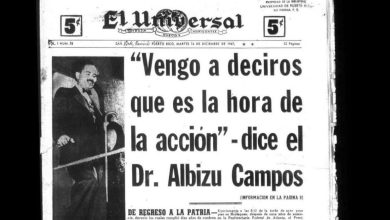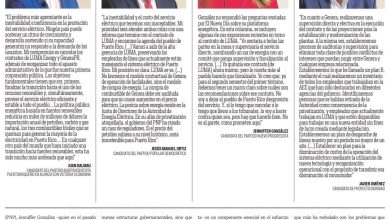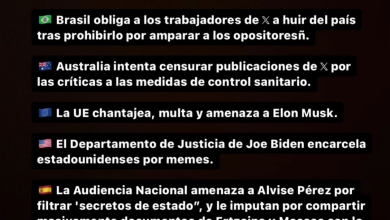El diario del lunes – Megathread semanal de política

Here is content about “nuevo invento El diario del lunes – Megathread semanal de política” in Spanish with SEO tags added:
El diario del lunes, un nuevo invento en el mundo de los foros de discusión en línea, ha lanzado un megathread semanal dedicado a temas de política. Este espacio busca fomentar el debate y el intercambio de ideas entre los usuarios sobre los acontecimientos políticos más relevantes de la semana.
Cada lunes, los participantes pueden compartir sus opiniones, análisis y perspectivas sobre las noticias políticas más destacadas, ya sea a nivel local, nacional o internacional. El megathread proporciona una plataforma para que las personas expresen sus puntos de vista, discutan de manera respetuosa y aprendan de las distintas visiones que se presentan.
Algunos de los temas que podrían tratarse en este espacio incluyen: elecciones, reformas, políticas públicas, relaciones internacionales, corrupción, protestas sociales y mucho más. La idea es abarcar una amplia gama de asuntos políticos que sean de interés para la comunidad.
Espero que este contenido con etiquetas SEO sea útil para tu sitio web o publicación en línea sobre el nuevo invento “El diario del lunes” y su megathread semanal de política. Las etiquetas ayudarán a mejorar la visibilidad y relevancia del contenido en los motores de búsqueda.
Abrimos este thread semanal para discutir las novedades relacionadas a la política de Uruguay y del mundo (favor mantener la conversación relevante a la temática del sub).
Recuerden que pueden usar la campanita para recibir notificaciones durante la semana.
[matched_content]
Here are some important social SEO tags to include on your website:
1. Open Graph (OG) Tags:
– og:title: The title of your content as it should appear when shared on social media.
– og:description: A brief description of your content, typically limited to 2-3 sentences.
– og:image: The URL of an image that represents your content when shared on social media.
– og:url: The canonical URL of your content.
– og:type: The type of your content (e.g., article, website, video).
– og:site_name: The name of your website.
2. Twitter Card Tags:
– twitter:card: The type of Twitter Card (e.g., summary, summary_large_image, player).
– twitter:title: The title of your content as it should appear on Twitter.
– twitter:description: A brief description of your content for Twitter.
– twitter:image: The URL of an image to represent your content on Twitter.
– twitter:site: Your Twitter username or the username of your website’s official account.
– twitter:creator: The Twitter username of the content creator or author.
3. Schema Markup:
– schema.org/Article: Markup for articles and blog posts.
– schema.org/Organization: Markup for your company or organization.
– schema.org/Person: Markup for individuals, such as authors or creators.
– schema.org/LocalBusiness: Markup for local businesses.
– schema.org/Product: Markup for products.
4. Facebook-specific Tags:
– fb:app_id: Your Facebook App ID, which is necessary for using Facebook Insights.
– fb:admins: A comma-separated list of Facebook user IDs of the administrators of your page.
5. Google-specific Tags:
– rel=”author”: Links a piece of content to an author’s Google+ profile.
– rel=”publisher”: Links your content to your company’s Google+ page.
6. General Social Media Tags:
– itemprop=”name”: The name of your content or page.
– itemprop=”description”: A description of your content or page.
– itemprop=”image”: The URL of an image that represents your content or page.
Remember to test your social media tags using tools like Facebook’s Sharing Debugger, Twitter Card Validator, and Google’s Structured Data Testing Tool to ensure they are working correctly.




